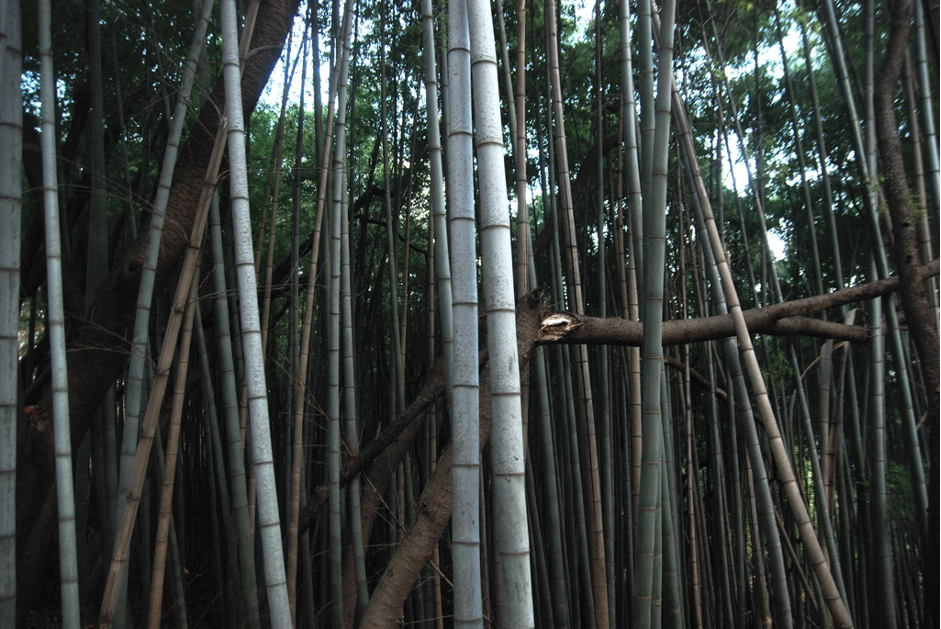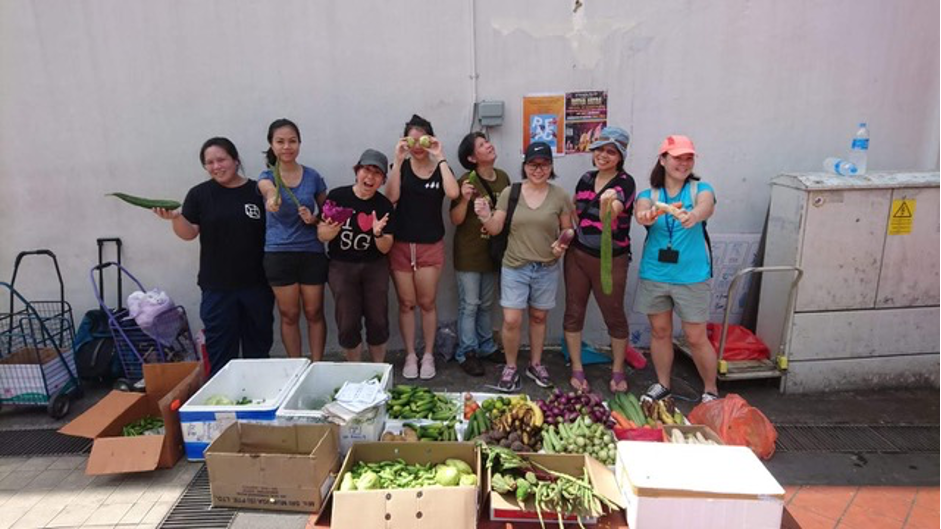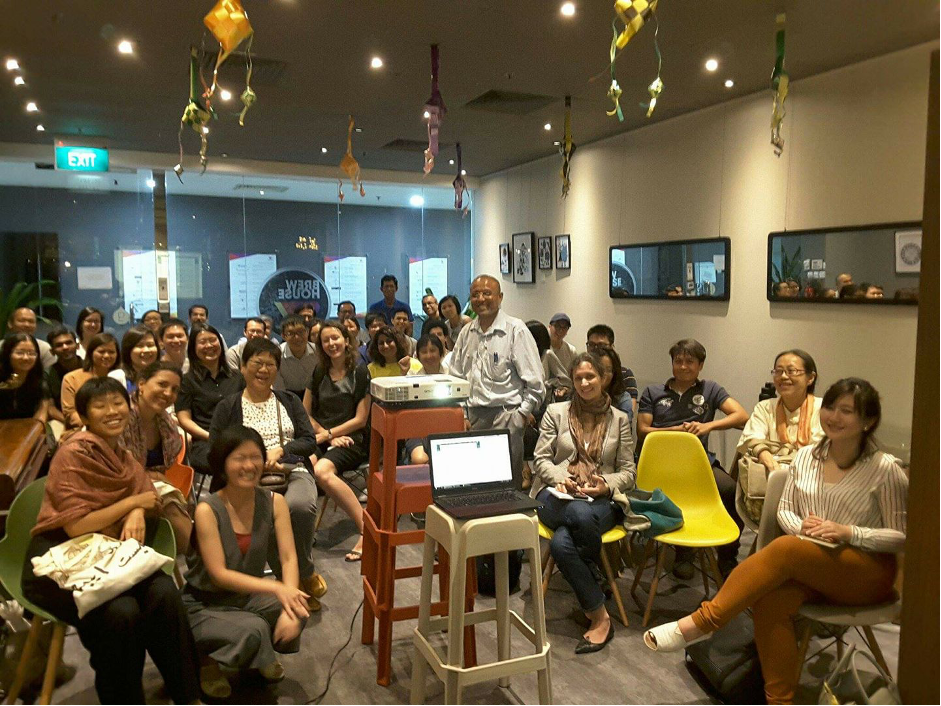On the Quest for Wisdom
Published by SHARECITY on the 30th November 2020.

On the Quest for Wisdom
By Monika Rut
Hi everyone, my name is Monika Rut and I recently completed my PhD with SHARECITY investigating ICT-mediated food sharing and sustainable food transitions in Singapore.
A Doctor of Philosophy, also known as PhD or DPhil, comes from the Greek word (φιλοσοφία) for the ‘love for wisdom’. For many of you out there working on a quest of love for wisdom, the PhD is at its core, an iterative and messy process that reveals the entangled nature of knowledge-seeking.
We read papers (and we read more papers), present at conferences, write proposals, teach, conduct field and laboratory work, code, triangulate, synthesise, and on and on, again and again, until the quest results in wisdom. All of these steps that are taken are situated within a larger socio-material contexts of departmental coffee breaks, overdue library books, sticky post notes, theories too complex to challenge, WhatsApp chats and Zoom meetings which are inevitably accompanied by stomach rumblings and heart racing episodes.
You can call it a mess and we, PhD students, are expected to make sense out of it for the love of learning and relief of those who guide us through. Last week, in November 2020, I found myself on the end of the quest, where I was confronted with having to defend my research on ICT-mediated food sharing practices in Singapore. Ironically, due to COVID-19 my PhD Viva was also ICT-mediated and virtual!
It went well, and trust me as a newbie Doctor, I will share a few survival tips for those somewhere between the start and the end of their quest for wisdom.
Let time be on your side
During the PhD you will experience an ever increasing sense of the scarcity of time that will make you feel that you are always ‘missing out’ on important matters, because there is always something new to do: an article to read, another interview to partake in, a professor to network with, a paper to write or a conference to attend. It is like walking into the forest, the deeper you go the messier it gets.

Bamboo Forest in Japan.
Source: Monika Rut personal photography
But slowly, you find yourself emerging out of the forest with a healthy relationship with time, which helps you to understand that your research requires taking a reflexive stance in which we (as researchers) come to peace with unknowns and our limitations. While most of us out there in the middle of their PhD careers want to be perfect by letting the research-mind roar wildly, we still need to remind ourselves to not rush this time and again to take a rest, restore the focus, get grounded again and rise.
Imagine yourself running into an elevator, suddenly standing in front of you is the sought after politician you have been wanting to track down and address your questions and societal problems to. Will you be ready for an elevator pitch or will you still keep processing and analysing parts of that research paper that you read at 2:00am the night before?
Remember to care
In the course of the PhD we are meant to provide a novel contribution; it is a process that involves mingling of knowings and doings that are pulsing with ambitions and energy to produce something new (e.g. a method, a publication etc). True, if we don’t build the PhD on stretching and transforming diverse fields of knowledge how can we expect to progress our academic careers? Of course, pursuing a PhD is to be a growth-oriented experience involving a desire to become an independent thinker, who is also capable of rapidly expanding her or his circuits of knowing and being known.
However, since we are trained to follow research ethics concerned with moral behaviours (e.g. through ethics approval and consent forms), we also need to consider to move forward with care. This means incorporating research practices such as listening, trusting, being committed and aware of our positionality as researchers so that we are better able to include diverse voices and perspectives in the same frame and make visible the fragility of knowledge making (and knowledge breaking).

Dumpster diving with SG Food Rescue in Little India, Singapore.
Source: Monika Rut personal photography
Make use of doubt
There will be many emotional detours and mental blockages to embrace during the course of a PhD. For example, you can be stuck by not knowing how to move forward in your discussion chapters, or you can get overwhelmed because there will always be much more you could have done to provide compelling evidence for your key findings. Some questions that will keep you awake at night will span from theoretical aspects of your work – for example, whether you managed to challenge or expand weak points of a theory – to epistemological underpinnings of your methodological design.
These paralysing feelings of doubt are part of the PhD and engaging in conversations about them are also a part of the research process that cannot be ignored. As we go forward, engaging with constructive criticism and self-doubt becomes a matter of academic integrity. This also means talking to people around you, such as your supervisor/(s) and colleagues in your department who can help you challenge and face the fear and anxiety of doubting your skills, talents, and accomplishments.
Scaling horizontally
While there is a certain pressure to scale up your research in terms of disseminating the findings through peer reviewed journals, research briefs, blogs, and social media updates, it is also important to ask yourself why and for whom you are actually doing it.
Thinking through matters specific to scaling, I found that it is also important to address the question: What impact will your work actually have and why? Many might reply to such a question by simply stating the impact factor of a journal in which they have last published. However, it might well be that engaging in an in-depth work process (that goes beyond the expected research targets) with communities would help us to better understand the impact of our work.
During my PhD, I looked for opportunities to scale up my research in a more deep, or horizontal manner, by involving local practitioners in Singapore and other cities in collaborative writing, organising workshops with non-expert audiences, and volunteering. As researchers we do have capacity to provide a reflexive learning space for diverse people to come together, circulate ideas in a more democratic manner and provide alternatives to dominating structures of knowledge.

Discussing food sharing with practitioners in Singapore.
Source: Monika Rut personal photography
Life goes on
There are many motivations behind our decision to do a PhD; some of us are interested in an academic career, others want to expand their knowledge, perhaps learn new skills, and/or specialise in a specific area of research.
Regardless of the motivations, doing a PhD is a life-consuming process that can cause disruption in your everyday routines as we often tend to focus solely on concerns manifesting in our immediate work engagements (e.g. our university, research centres, etc). However, it is very important not to forget all of the relationships that make up the fabric of our lives…and of course our research!
During my PhD, I encountered doctoral students who were also taking care of a family, including raising kids, caring for a sick parent, running households, and working part time in a different industry. Thus, whilst many are certainly privileged to immerse themselves in the research without running into work-life challenges, we do have a responsibility towards others (regardless of standing) through the commitment, reciprocity, openness, and care that make our research areas less of a self-serving accomplishment.
Certainly, making the quest of a PhD is different for everyone but I can only hope to inspire those who are on such a path to listen actively, use your voice to question authority and practices that prevail, and to remain aware that it is your path and that path leads forward regardless of the number of turns it might take.
I would like to express my gratitude to my supervisor Professor Anna Davies for her guidance, patience, and immense knowledge and expertise during the research process! Thanks to the food sharing communities in Singapore for their insights, hard work and time spent together, and to the SHARECITY researchers and colleagues in the Department of Geography at Trinity College Dublin for convivial relationships and knowledge sharing.
If you wish to get in contact you can email me at rutm@tcd.ie or on Twitter here.
Thank you!
Monika Rut
© 2015 - 2025 ShareCity | Web Design Agency Webbiz.ie






